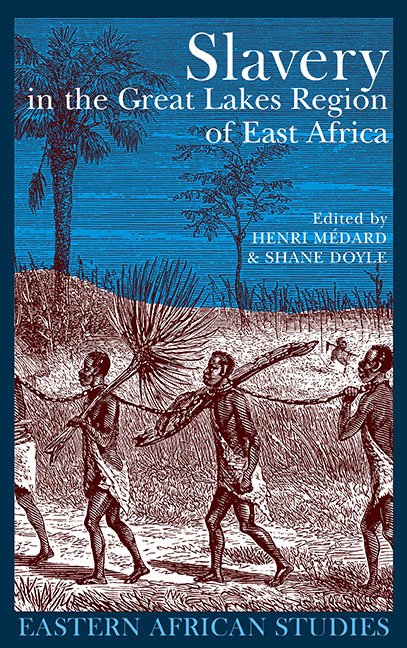Book contents
- Frontmatter
- Dedication
- Contents
- List of Maps & Tables
- Notes on Contributors
- Introduction
- 1 Violence, Marginality, Scorn & Honour: Language evidence of slavery to the eighteenth century
- 2 Notes on the Rise of Slavery & Social Change in Unyamwezi c. 1860 –1900
- 3 Slavery & Forced Labour in the Eastern Congo 1850 –1910
- 4 Legacies of Slavery in North West Uganda: The story of the ‘One-Elevens’
- 5 Human Booty in Buganda: Some observations on the seizure of people in war c.1700 –1890
- 6 Stolen People & Autonomous Chiefs in Nineteenth-Century Buganda: The social consequences of non-free followers
- 7 Women's Experiences of Enslavement & Slavery in Late Nineteenth- & Early Twentieth-Century Uganda
- 8 Slavery & Other Forms of Social Oppression in Ankole 1890 –1940
- 9 The Slave Trade in Burundi & Rwanda at the Beginning of German Colonisation 1890 –1906
- 10 Bunyoro & the Demography of Slavery Debate: Fertility, kinship & assimilation
- References
- Index
4 - Legacies of Slavery in North West Uganda: The story of the ‘One-Elevens’
Published online by Cambridge University Press: 11 August 2017
- Frontmatter
- Dedication
- Contents
- List of Maps & Tables
- Notes on Contributors
- Introduction
- 1 Violence, Marginality, Scorn & Honour: Language evidence of slavery to the eighteenth century
- 2 Notes on the Rise of Slavery & Social Change in Unyamwezi c. 1860 –1900
- 3 Slavery & Forced Labour in the Eastern Congo 1850 –1910
- 4 Legacies of Slavery in North West Uganda: The story of the ‘One-Elevens’
- 5 Human Booty in Buganda: Some observations on the seizure of people in war c.1700 –1890
- 6 Stolen People & Autonomous Chiefs in Nineteenth-Century Buganda: The social consequences of non-free followers
- 7 Women's Experiences of Enslavement & Slavery in Late Nineteenth- & Early Twentieth-Century Uganda
- 8 Slavery & Other Forms of Social Oppression in Ankole 1890 –1940
- 9 The Slave Trade in Burundi & Rwanda at the Beginning of German Colonisation 1890 –1906
- 10 Bunyoro & the Demography of Slavery Debate: Fertility, kinship & assimilation
- References
- Index
Summary
Introduction
Following the seizure of power in Uganda by General Idi Amin Dada, on 25 January 1971, the country plunged into a decade of chaos. As Amin's rule went on, it rested increasingly on the support of a small group of people known in Uganda as ‘Nubians’ or ‘Nubi’, to which Amin himself was considered to belong. There is now a certain amount of historical literature on the Nubi, who were believed to be the descendants of former slave-soldiers from Southern Sudan. These slave-soldiers had come into what is now Uganda in the late 1880s under the command of a German-born officer known as Emin Pasha, General Gordon's Governor in Equatoria Province of Sudan at the time of the Mahdi's Islamic uprising. It was these soldiers, taken on in 1891 by Frederick Lugard of the Imperial British East Africa Company, who formed the core of the forces used to carve out, not just Uganda, but much of Britain's East African Empire.
In this essay I examine the changing meanings of ‘Nubi’ identity, from its roots in the Sudanese slave-soldier system to the present day, through a focus on the role of the Nubi in the area of Uganda to which Emin took his troops, known in the colonial era (and still widely referred to in Uganda today) as West Nile district, where I carried out archival and ethnographic research between 1995 and 1998. West Nile is the area north of Lake Albert, to the west of the Nile River as it flows northwards to Sudan. Today this is the north-west corner of Uganda, by the borders with Congo-Zaire and Sudan. In the early twentieth century this area changed imperial hands three times; part of King Leopold's Congo territories until his death in 1909, it reverted to Sudanese authority (then under the Anglo- Egyptian Condominium) before being exchanged with the Uganda Protectorate for a parcel of territory to the east (occupied by the Bari people).
- Type
- Chapter
- Information
- Slavery in the Great Lakes Region of East Africa , pp. 124 - 144Publisher: Boydell & BrewerPrint publication year: 2007



